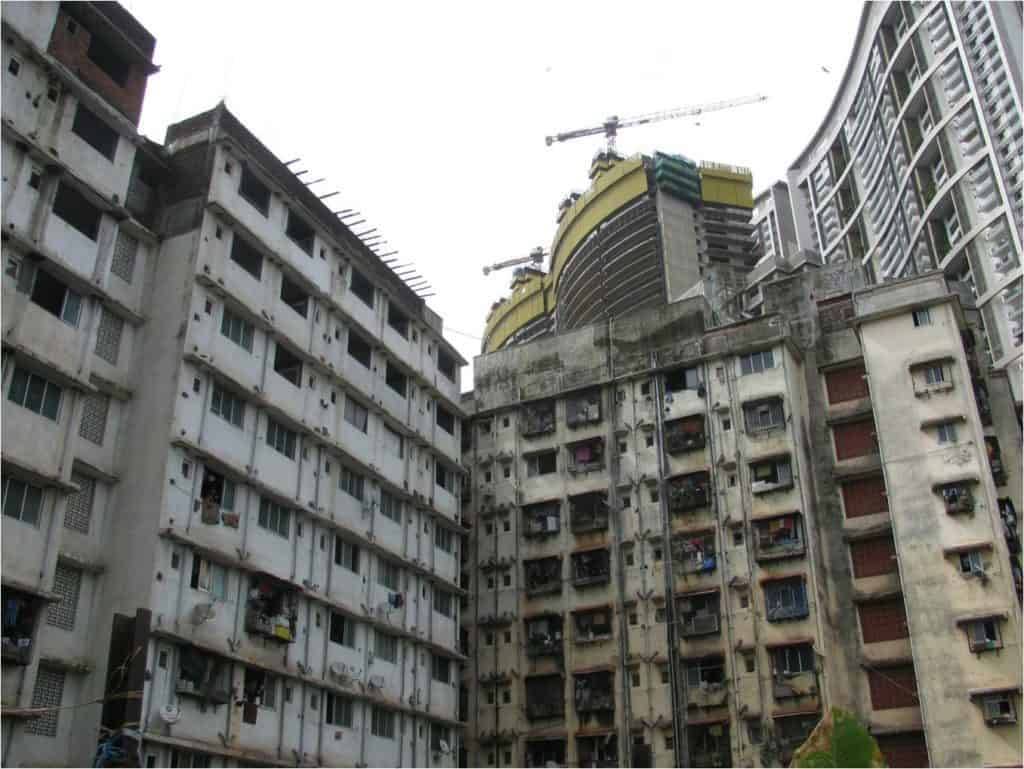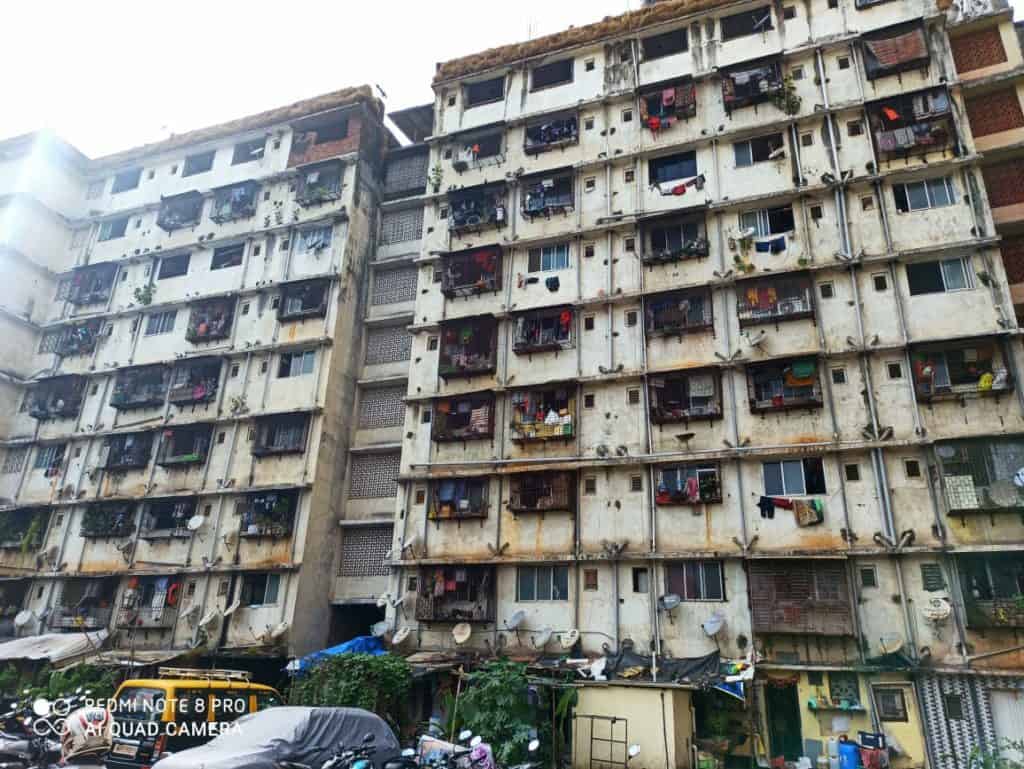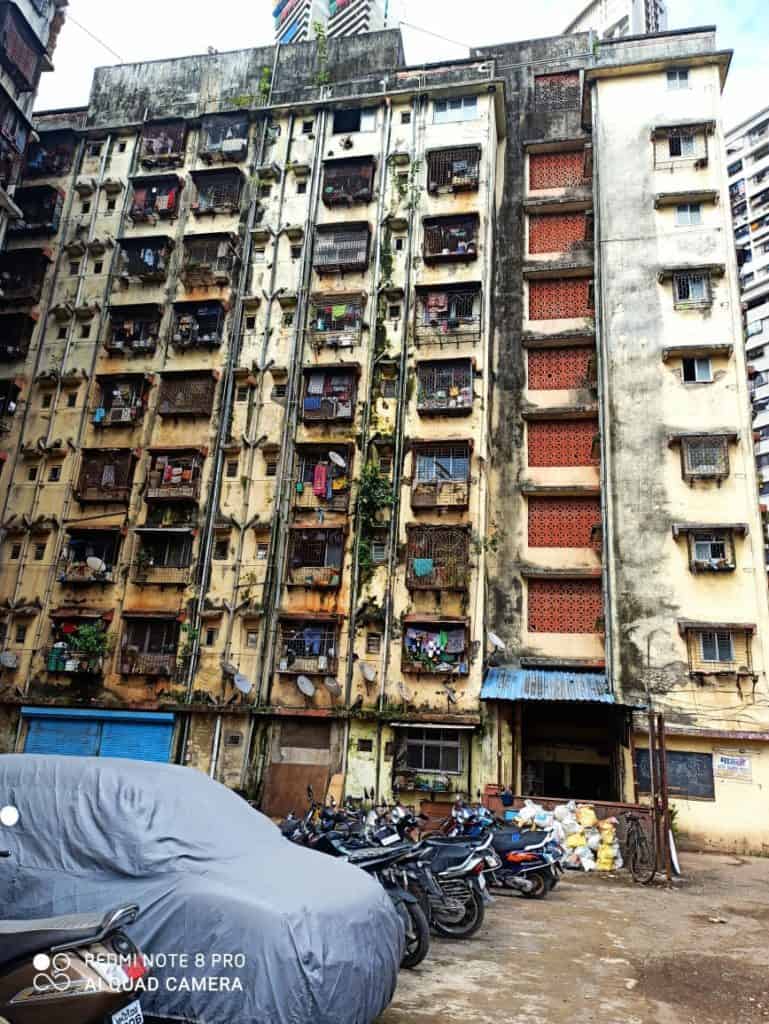Mallappa Korvi, a lift mechanic, was hopeful. After decades spent in a 6X6 room, a 220-square foot apartment would have been an enormous improvement. Since the early 90s, 390 residents, of a 3,827-square metre plot near Dhobi Ghat in Mahalakshmi, had tried to engage a real-estate developer for rehabilitation.
But when no developer was willing, they decided to steer the project in another direction. The residents formed a society called Ganesh Nagar D Co-operative Housing Society with the assistance of Slum Rehabilitation Society (SRS), a local NGO working towards providing “accommodation to hutment dwellers” in Mumbai.
From 1998 to the early 2000s, Ganesh Nagar D was in the throes of a revolution. It was being avidly followed by mainstream media, discussed by residents of the city’s various bastis, and studied by global urban studies experts like Jan Nijman. If all would have gone well, it would have become the first slum self-development project in the city.

SRS was not new to the project site, nor were they strangers to the community members. In 1988, a fire, not too uncommon in Mumbai’s impenetrable slums, had ravaged the Ganesh Nagar slum. The houses were scorched, destroyed; its residents in need of assistance. Adolf Tragler, the founder of SRS, was alerted. His team members and volunteers arrived to help.
Over the years, SRS forged a close affinity with the slum community, Manohar Rajguru, Project Officer at SRS, says. SRS wields the reputation of being one of Mumbai’s foremost organisations working on housing for low-income residents. They have worked on slum rehabilitation projects in Bandra, slum upgradation in Wadala and Andheri, and assisted governments with resettlement of project-affected persons across Mumbai.
When the Maharashtra Government launched the Slum Rehabilitation Scheme that created the Slum Rehabilitation Authority (SRA) in 1995, the Ganesh Nagar D Co-operative Housing Society and SRS secured a framework for self-development.
For years, housing activists have tried to mobilise support for self-development instead of a builder-driven rehabilitation and resettlement as the SRA Act (Slum Rehabilitation Authority Act, 1995) allows communities to come together as a cooperative society and appoint their own developer. But, even after all these years, the idea is still raw and unexplored. The pitfalls are clear when one observes Ganesh Nagar’s attempts.
When the Ganesh Nagar D Co-operative Housing Society submitted a proposal to SRA in 1998, the project was “approved as the first slum self-development project in Mumbai,” Yorick Fonseca, Secretary & Director, SRS, says. “The residents were empowered to redevelop the slum with SRS’s assistance. We played the role of a margdarshak.” Fonseca joined SRS in 2012, but he has studied the Ganesh Nagar slum project in detail over the few years.
One of the first steps was to iron out the finances. Each family contributed Rs 25,000 and SRS contributed Rs 30 lakhs for the construction. A loan of Rs 55 lakhs was secured from HDFC bank. This was said to be one of the first occasions in India when “a private bank financed a slum rehabilitation project in which the slum dwellers themselves were the developers and the loan was made directly to them,” Jan Nijman wrote in his paper, Against the odds: Slum rehabilitation in neoliberal Mumbai.
But the loan and donation was not enough. A large chunk of the project was going to be financed through Transferable Development Rights (TDR), a financial incentive aimed at engaging developers in low-income housing projects. Under this scheme, developers can obtain or purchase TDR in tranches which allows them to build on another site with an additional Floor Space Index (FSI). As the Ganesh Nagar society was being self-developed, the slum society planned to generate money for the project by selling TDRs to interested developers.
The society also decided to sell a few flats in the newly-constructed buildings to foot the bills. Considering the peculiar nature of financing this project, the construction was planned in three phases with three buildings. In the meantime, the residents whose homes were demolished rented kholis in nearby slums.
Korvi claims that he had spotted irregularities in the sale of a TDR tranche, in 2005-06. “The chairman and secretary sold a TDR through forged documents and at a price lower than the market price,” Korvi says. Korvi adds that he informed the Slum Rehabilitation Authority about the misconduct but they didn’t take any action. “There was no audit and the accused was allowed to remain, and was later reappointed, as the chairman.” Three years later in 2009-10, as another tranche of TDR was generated, the society members, under the leadership of Korvi, accused the two members of swindling the TDR money that was meant for the construction of the project.
In 2009-10, when the second building was about 80% completed, SRS was alerted to an alleged fraud. “The purchaser of a tranche of TDR transferred an initial sum of money to the joint account being managed by the slum society and SRS,” Fonseca says. “There were two signatories from the slum society and two from SRS. But somehow the bank account was compromised, our names as joint signatories removed, and the funds unauthorizedly siphoned out to another account. We filed a criminal complaint and the project came to a halt not long after, pending investigation.” The society chairman Bharat Gayekar and secretary Sharad Mohite were taken into custody.
The Society members filed an FIR in the Agripada police station, and later a case at the Cooperative court, Mumbai. The case is being investigated by multiple agencies including Agripada Police Station; the Economic Offences Wing (EOW) of the Mumbai Police; and, at one time, the Directorate of Income Tax (Intelligence and Criminal Investigation).
Citizen Matters reached out to society secretary Sharad Mohite who denied the allegations and called them baseless. “The other committee members falsely accused us (him and the late Gayekar) and stopped the construction,” he says.
Today, almost a decade later, the incomplete Ganesh Nagar D slum rehabilitation project is reminiscent of many learnings for SRS. “Slum rehabilitation projects are extremely complex because of factionalism and infighting,” Fonseca says. “There are many upright people among slum dwellers, but there are also a few who are out to game the system and seek undue personal benefit” he adds.
The project could have been completed in 2008 and pioneered self-development across the city, Korvi says. But it remains undone. About 100 of the 390 residents, including Korvi, haven’t received flats and they’ve either moved away or continue to live in makeshift settlements. Many, Fonseca points, are living in the unfinished Phase 2 building without receiving an Occupancy Certificate (OC).


During its inception, the project was praised for its members’ homogeneity and unison. “There was 100% … consensus and an exceptionally strong sense of cohesion among the slum households”, Nijman wrote. “People were zealous. They took initiative and that’s why we could proceed with the project,” Manohar Rajguru, Project Manager, SRS says, “but then greed stepped in.”
“Greed” is a word that features repeatedly in conversations with SRS, but it’s not only in reference to the Ganesh Nagar D Co-operative Housing Society. “We tried working on another self-development project near Mahakali Caves in Andheri (East), but at the nth hour, a slum society member sidestepped us and enrolled a real-estate developer for development.”
Slum rehabilitation through SRA is often accused of thwarting people’s participation, favouring developers, and being wrought with opaque policies. But Rajguru finds that even in the case of slum self-development where the first step is forming societies, appointments, especially of the chairperson and secretary, can be politically motivated and unclear. Still, Rajguru is optimistic that if there’s a conjunction of participation through driven, motivated residents and transparent practices, slum self-development projects can be completed.
Seventeen years on, Mallappa Korvi is still waiting to move into a flat. But despite the years of litigation, he is hopeful that the third building would come up to become an example of slum self-development in Mumbai.
Dear Apekshita,
I am a residential member of Ganesh Nagar d co-op hsg society.
The blog which you have posted is somewhere misleading the facts and it’s not completely true. I have been residing in the same premises since 1994 to till date and I have seen all the efforts and hard work of people’s who gave there life to make this project possible. The actual credit is of that person whose vision was so big and towards the welfare of the society member but due to blames and continues objections of few cowards the project stand incomplete. Everything can’t possibly text on comments, but still if you need true and fair details alongwith fact then do visit the place. Will always there for you.
Thanks
Thank you for your comment. Please email me at apekshita@citizenmatters.in